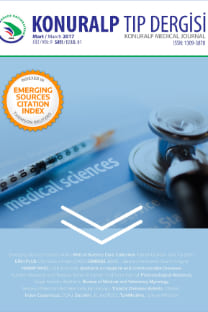Birinci Basamak Sağlık Hizmetlerinin MOOC’lar (Yoğunlaştırılmış Açık Kurs) Aracılığıyla Güçlendirilmesi- Kesitsel Bir Çalışma
Birinci basamak, MOOC, COVID-19
Strengthening Primary Health Care Through MOOCs (Massive Open Online Courses): A Cross-Sectional Study
primarycare, MOOC, COVID-19,
___
- 1. Sudip Bhattacharya AS, Jayanti Semwal, Roy Rillera Marzo, Neha Sharma, Manish Goya, Shaili Vyas AS. Impact of a training program on disaster preparedness among paramedic students of a tertiary care hospital of North India: A single group, before–after intervention study. Educ Health Promot. 2020;9:5.
- 2. Sünnetçi Silistre E, Hatipoğlu HU, Yeşilbaş O, Şükrü Gürbüz F, Öztürk E, Yalçınkaya A. Investigating the psychological impact of COVID-19 on healthcare workers in the intensive care unit. J Surg Med. 2022;6(1):29–35.
- 3. Hanratty J, Keenan C, O’Connor S, Miller S, Bradley D, Dempster M. PROTOCOL: Psychological and psychosocial determinants of COVID Health Related Behaviours (COHeRe): A suite of systematic reviews and an evidence and gap map. Campbell Syst Rev. 2022;18(1).
- 4. Han JL, SH. The Future of Service Post-COVID-19 Pandemic: Rapid Adoption of Digital Service Technology. 2021;1(1):1–232.
- 5. Gökdemir Ö, Özkan Bayrakçı N, Aygün O, Hoedebecke K. The perspectives of young general practitioners/family physicians on MOOC as part of continuous education: a descriptive semi-qualitative multinational study. Turkish J Biochem. 2021;0(0):1–7.
- 6. Impey C, Formanek M. MOOCS and 100 Days of COVID: Enrollment surges in massive open online astronomy classes during the coronavirus pandemic. Soc Sci Humanit Open 2021;4(1):100177.
- 7. Nur S, Safri W. Massive Open Online Course (MOOC): Our saviour during COVID-19 pandemic? 2020;120–8.
- 8. Salamah UG, Helmi RAA. MOOC platforms: A review and comparison. Int J Eng Technol. 2018;7(4):70–4.
- 9. Safri SN, Mohi Z, Hanafiah MH. Massive Open Online Course (MOOC): Our saviour during COVID-19 pandemic? J Tour Hosp Culin Arts. 2020;12(3): 120–8.
- 10. Hoedebecke K, Mahmoud M, Yakubu K, Kendir C, D’Addosio R, Maria B, et al. Collaborative global health E-learning: A Massive Open Online Course experience of young family doctors. J Fam Med Prim Care [Internet]. 2018;7(5):884–7.
- 11. Orsini-Jones M, Pibworth-Dolinski L, Cribb M, Brick B, Gazeley-Eke Z, Leinster H, et al. Learning about language learning on a MOOC: how Massive, Open, Online and “Course”? 2015;(2015):450–7.
- 12. Hew KF. Unpacking the strategies of ten highly rated MOOCs: Implications for engaging students in large online courses. Teach Coll Rec. 2018;120(1).
- 13. Du M, Qian Y. Application of Massive Open Online Course to Grammar Teaching for English Majors Based on Deep Learning. Front Psychol. 2022;12.
- 14. Zhang Y. Faculty experiences in massive open online courses (moocs). The Unıversıty of Hawaı‘I at Mānoa;2021.
- 15. The Univeristy of Copenhagen’s MOOC Unit. Massive Open Online Courses at the University of Copenhagen - Experiences from the first two years. 2015;1–33.
- 16. Blakemore LM, Meek SEM, Marks LK. Equipping learners to evaluate online health care resources: Longitudinal study of learning design strategies in a health care massive open online course. J Med Internet Res. 2020;22(2):1–14.
- 17. Abdulai AF, Tiffere AH, Adam F, Kabanunye MM. COVID-19 information-related digital literacy among online health consumers in a low-income country. Int J Med Inform [Internet]. 2021;145:2020;104322. 18. Gong Z. The development of medical MOOCs in China: current situation and challenges. Med Educ Online. 2018;23(1).
- 19. Giasiranis S, Sofos L. The Effect of Self-Regulation in a MOOC Environment on the Completion and Performance of Learners. Open J Soc Sci. 2020;08(10):127–58.
- 20. Chevalère J. Towards dynamically monitoring computer-assisted instruction to reduce educational inequality. Learn Res Pract. 2022;8(2):133–8.
- 21. Papermaster AE, Whitney M, Vinas EK. Interprofessional Case Conference Enhances Group Learning and the Quality, Safety, Value, and Equity of Team-Based Care. J Contin Educ Health Prof. 2023;43(1):4–11.
- ISSN: 1309-3878
- Yayın Aralığı: Yılda 3 Sayı
- Başlangıç: 2009
- Yayıncı: Düzce Üniversitesi Tıp Fakültesi Aile Hekimliği AD adına Yrd.Doç.Dr.Cemil Işık Sönmez
Obezite Cerrahisi Hastalarında Obstrüktif Uyku Apne Sıklığı
Ali Nihat ANNAKKAYA, Ege GÜLEÇ BALBAY, Mevlüt PEHLİVAN, Öner BALBAY
Aile Hekimliği Pratiğinde Trombofili ve Tarama
Funda KOCAAY, Hilal Melis ALTINTAŞ
Non-Spesifik Bel Ağrılı Hastalarda Lumbal Lordoz Açısı ve Lumbal Kas Kalınlıklarının MRG Analizi
Ali Cihan DAĞLI, Serkan ÖNER, Zülal ÖNER, Beyza YAZGAN DAĞLI
Sibel PEKSOY KAYA, Pervin DEMİR, Sena KAPLAN, Sevil ŞAHİN
Şenay KOÇAKOĞLU, Dursun ÇADIRCI, Mehmet Şevki ÇADIRCI, Mehmet Ali EREN
Yusuf ŞENOĞLU, Ali TEKİN, Olcay YILDIRIM, Dursun BABA, Alpaslan YÜKSEL
Hipertansif Yaşlı Bireylerin Uyum Düzeyleri ve İlişkili Faktörler: Kesitsel Bir Çalışma
Önder SEZER, Ezgi Sezin CEZİK, Hamdi Nezih DAĞDEVİREN
Üçüncü Basamak Bir Hastanede Acil Servis Nöroşirurji Konsültasyonları
Erdinç ŞENGÜLDÜR, Kudret SELKİ, Cengiz TUNCER, Mehmet Cihat DEMİR
Ozden GOKDEMIR, Sudip BHATTACHARYA, Maria BAKOLA, Halime Seda KÜÇÜKERDEM, Gazmend BOJAJ, Kyle HOEDBECKE, Eleni JELASTOPULU
